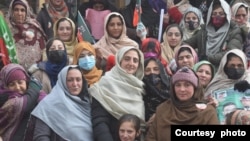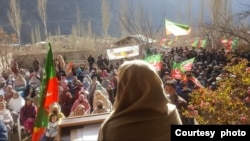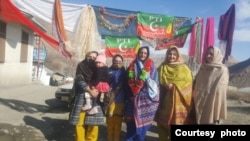When Suriya Bibi was running for a seat earlier this year on the Khyber Pakhtunkwa provincial assembly, she faced numerous challenges beyond being a woman and hailing from a minority sect in Pakistan's remote district of Chitral.
Another obstacle appeared when the Election Commission randomly assigned a hen symbol as her identifier on ballot papers — such symbols are tools to aid illiterate voters. In January, Pakistan's Supreme Court barred her political party, Pakistan Tehreek-e-Insaf, or PTI, from using the cricket bat symbol associated with former Prime Minister Imran Khan.
The hen symbol inadvertently perpetuated the stereotype that women in Chitral were better suited for poultry farming than politics. Her opponents capitalized on their good luck, ridiculing her and mocking the symbol's association with domesticity.
In a phone interview with VOA, Bibi said that there was no shame in poultry farming and rejected the attempt to diminish her worth based on her election symbol.
History made
Bibi made history in early February by becoming the first woman from Chitral district to secure an assembly seat through a direct election rather than assuming a seat reserved for women, as is customary in the region. Not only did she clinch victory in the PK-1 constituency in Chitral with a decisive majority, but she also ascended to the position of deputy speaker in the Khyber Pakhtunkhwa assembly.
In Pakistan, where women's involvement in governance is often restricted, Bibi encountered obstacles while navigating and challenging traditional norms to carve out her place in male-dominated politics.
According to social critic and feminist writer Sabahat Zakariya, Bibi belongs to the rare category of women parliamentarians who have secured their positions through open seats without relying on the political influence or lineage of male family members.
“Currently, all the big female names in Pakistani politics are scions of big feudal or industrial political families,” Zakariya said. “In that, Suriya Bibi’s achievement is not just unique for Chitral but also [for] all of Pakistan.”
Campaigning in rough terrain
Bibi also reflected on how the severe winters and the daunting terrain of the Hindukush mountains presented yet another challenge to her campaign.
Dilapidated roads and inadequate infrastructure made reaching the remote areas of her constituency difficult. Spanning approximately 210 kilometers (about 130 miles), the upper Chitral PK-1 district encompasses the farthest village, Broghil, which borders the Badakhshan province of Afghanistan.
“Sometimes, I had to walk kilometers on foot when there were no roads for vehicles," she said. "Despite facing these difficulties and even being unwell at times, I remained dedicated to connecting with people and meeting voters. The support of women who walked with me provided comfort and bolstered my determination throughout this demanding campaign.”
Bibi grew up with both her father and a grandfather engaged in local politics and knew that she, too, wanted to be a politician.
“Despite my family's support for another party, I made an independent choice and joined Pakistan Tehreek-e-Insaf, PTI party, [which means] 'Pakistan movement for justice,' in 2007,” she said.
“Joining politics, I initially faced resistance and received criticism for participating in protests and rallies, as it wasn't common for women in the conservative region like Chitral to break through a male-dominated field like politics.”
Starting as a grassroots worker, Bibi began by mobilizing women at the village level, then represented Chitral as a female leader and then became the vice president of PTI Malakand Division. So, she ascended through the ranks within her party before getting a nomination to run for election from the party.
Bibi’s campaign efforts encouraging women to go out and vote resulted in women surpassing male votes for the first time in the region’s history. In total, 35,377 women voted, compared with the 30,345 votes from men.
In Chitral, where no local woman had previously secured an electoral victory and where her opponents wielded greater financial resources, Bibi initially doubted her chances.
“Men establish connections, friendships, and network with party officials, gaining exposure and influence," she said. "However, as a woman, I couldn't do the same. Despite these challenges and cultural norms, I only had dedication and the unwavering support of my family, particularly my husband. He consistently encouraged me when I was nominated to run for the seat, urging me to take it up as a challenge.”
Speaking about her plans, Bibi said her focus would be on tackling property rights issues for women and prioritizing girls' education. Given her background as an educator, she eagerly anticipates establishing a nursing school in the region, recognizing that young women who pursue nursing careers often must move far from their families.
Aspiring female students have begun approaching her about internship opportunities in her office, she said, reflecting a shift in the perception that politics are exclusively dominated by powerful men.
She said her political journey shows how even an ordinary middle-class woman like herself can ascend to great heights in the realm of politics.
This story originated in VOA’s Urdu Service.













